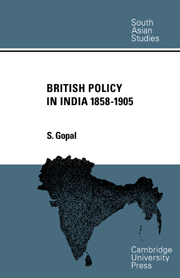Book contents
- Frontmatter
- Contents
- Preface
- Map 1 The Annexation of Burma
- Map 2 Afghanistan and Central Asia
- 1 The Aftermath of The Revolt, 1858–69
- 2 The Conservative Adventure, 1869–80
- 3 The Liberal Experiment—Ripon and Dufferin
- 4 Return to Caution, 1888–98
- 5 Curzon: The Apogee of Administration
- Conclusion
- Notes
- Bibliography
- Index
5 - Curzon: The Apogee of Administration
Published online by Cambridge University Press: 02 December 2009
- Frontmatter
- Contents
- Preface
- Map 1 The Annexation of Burma
- Map 2 Afghanistan and Central Asia
- 1 The Aftermath of The Revolt, 1858–69
- 2 The Conservative Adventure, 1869–80
- 3 The Liberal Experiment—Ripon and Dufferin
- 4 Return to Caution, 1888–98
- 5 Curzon: The Apogee of Administration
- Conclusion
- Notes
- Bibliography
- Index
Summary
All the characteristics of British rule in India in the forty years after the revolt of 1857 found their full, and even exaggerated, development in the seven years of Curzon's viceroyalty. The wave rose to a crescendo and broke, with almost explosive force, on the shore, carrying India to the second and final phase of British effort and achievement. India had become in 1858 a British dependency in the full sense, had been safeguarded, and had, after some years, even been cherished; but to Curzon it was not merely the central piece of the British empire but the focus of British interests. For perhaps the last time British policy in Asia was initiated not from Whitehall but from Calcutta; and a vigorous Viceroy laid down lines of policy and took crucial decisions, while the home government, in the early years, acquiesced with often little more than a mild and private reservation. Within India, efficient administration, on which a premium had been laid ever since the Crown assumed responsibility, now became an end in itself. Curzon was determined to administer well and, sparing neither himself nor his subordinates, succeeded in doing so; but so much effort was spent in perfecting the methods of administration that its objectives were lost from view.
For it was not sufficient to give the people what Curzon thought was best for them and to promote their material interests in ways which he considered most suitable.
- Type
- Chapter
- Information
- British Policy in India 1858-1905 , pp. 222 - 298Publisher: Cambridge University PressPrint publication year: 1965



